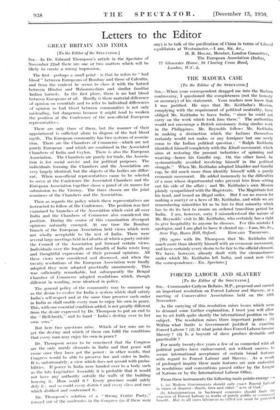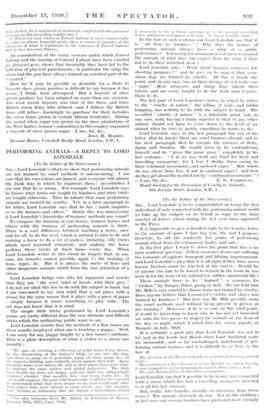FORCED LABOUR AND SLAVERY
[To the Editor of the SPECTATOR.]
Sur,—Commander Canyon Bellairs, M.P., proposed and carried an important resolution on Forced Labour and Slavery, at a meeting of Conservative Associations held on the 25th November.
As the carrying of this resolution raises issues which seem to demand sonic further explanation, I trust you will allow me to set forth quite shortly the international position on the subject. The resolution raises three important points : (1) Within what limits is Government justified in exacting Forced Labour ? (2) At what point does Forced Labour become Slavery ? (3) Is a boycott of slave produce desirable and practicable ?
For nearly twenty-five years a few of us connected with all political parties have endeavoured, not without success, to secure international acceptance of certain broad features with regard to Forced Labour and Slavery. As a result of prolonged inquiry these main features arc now embodied in resolutions and conventions passed either by the League of Nations or by the International Labour Mice.
From these instruments the following main points emerge :—
I. (a) Modern Governments should only exact Forced Labour in tunes of disaster—floods, fires and other " acts of God." (b) Administrations in backward countries should limit the exaction of Forced Labour to works of purely public or communal benefit. But in all cases labourers so called out must be provided whit shelter, food and medical treatment coupled with the payment of wages at the prevailing market rate.. 2. Whenever and wherever Forced Labour is used cm lllll erciallv in order to obtain financial profit, then it ceases to partake of the character of what is legitimate in the exaction of Forced Labour and in fact becomes Slavery.
An examination of the many systems under which Forced Labour and the leasing of Convict Labour have been exacted for financial gain, shows that invariably they have led to the infliction of physical punishments; in particular the whip, the chain and the gun have always formed an essential part of the " control."
How far it may be possible or desirable for a State to boycott slave grown produce is difficult to say because it has never, I think, been attempted. But a boycott of slave grown produce has been adopted on more than one meashm. The most recent boycott was that of the Swiss and three British cocoa firms who refused—and I believe the British firms still refuse—knowingly to purchase for their factories the cocoa beans grown in certain African territories. During the period when sugar was grown on the slave plantations of the West Indies, women's committees in this country organized a boycott of slave grown sugar.—I am, Sir, &c.,
Jon>: H. HARRIS.
Denison House, Vauxhall Bridge Road, London, S.11-.1.















































 Previous page
Previous page